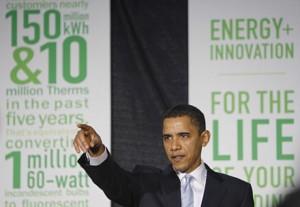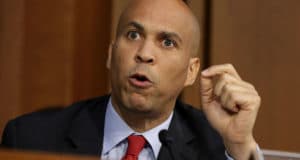President Obama stormed into office on the promise of change. His idea of change extended into the energy field, where he promoted energy independence along with pushing an alternative energy agenda. What have these campaign promises translated into with regard to our nation’s energy needs?
 As recently as March 2011, Obama proposed to cut America’s foreign oil imports by one-third over the next decade. This speech came shortly after the president addressed recent events in the Middle East, including American intervention in Libya, and contained a few ideas on how to address this goal: improve domestic energy production, promote the use of natural gas as an alternative to regular gas, improve fuel efficiency for cars and trucks, and boost alternative energy research and development.
As recently as March 2011, Obama proposed to cut America’s foreign oil imports by one-third over the next decade. This speech came shortly after the president addressed recent events in the Middle East, including American intervention in Libya, and contained a few ideas on how to address this goal: improve domestic energy production, promote the use of natural gas as an alternative to regular gas, improve fuel efficiency for cars and trucks, and boost alternative energy research and development.
Along with speaking out on alternative energy, the president has visited alternative energy sites such as wind farms, and this shows an understanding of the importance of alternative power. However, the lack of concrete plans leading the way forward on alternative energy fits with this administration’s pattern of leaving others to pave the way.
Last year in October, the Obama administration offered support for alternative energy by stating that solar panels would be installed on the White House, and that a solar hot water heater would be installed as well. As of July 2011, neither of these projects has materialized. The administration blames “the complexity of the contracting process,” and maintains that solar panels will be installed on the building. This failure is one small example of the administration’s inability to address our country’s energy needs.
Two presidents previously made use of solar energy: Jimmy Carter, who had solar panels installed on the White House back in the 1970s; and George W. Bush, who had several small solar power systems installed on outbuildings to provide some electricity and to heat an outdoor pool. Carter and Bush have already demonstrated the ease with which these projects can be accomplished, leaving it a poor excuse to blame the contractors.
The White House has also pushed for higher fuel efficiency standards, boosting offshore drilling, and reductions in oil imports. The administration may have had some small impact on fuel efficiency standards, but offshore drilling is mired in a complex maze of regulations and wrangling. Oil imports have decreased slightly due to high fuel prices that created a drop in consumer demand. Promoting responsible use of oil-based fuels is quite different from having people simply unable to afford to purchase them.
Obama is a strong supporter of corn-based biofuels, even though biofuel production is responsible for raising food prices around the world. The most popular crop used for biofuel is corn, and planting corn to use for fuel directly impacts the amount of corn sent on as food for people in numerous countries. In addition, farmers have to exercise caution in growing corn, as it will strip too many nutrients out of the soil if planted in the same fields every year. If that occurs, those fields will no longer be usable for farming.
 This ties in with the fact that biofuel companies are willing to pay more for corn than farmers are able to earn selling food crops. Reducing food production in order to increase crops for biofuels raises the cost of food. Continuing to use imported oil for our energy needs holds us hostage on the world political stage. Either way, the average American citizen is on the losing side. We make no money off of either product, and corporate interests take more money from us. Ultimately, we are better off pursuing other biofuel sources like algae, which does not impact our food production.
This ties in with the fact that biofuel companies are willing to pay more for corn than farmers are able to earn selling food crops. Reducing food production in order to increase crops for biofuels raises the cost of food. Continuing to use imported oil for our energy needs holds us hostage on the world political stage. Either way, the average American citizen is on the losing side. We make no money off of either product, and corporate interests take more money from us. Ultimately, we are better off pursuing other biofuel sources like algae, which does not impact our food production.
Congress has provided some relief for Americans on that front, in the form of removing tax credits for ethanol and biofuel producers. The ethanol subsidy accounts for nearly 75% of the total amount spent by the government on alternative fuels, and this money could go toward research and development of alternative fuels that will not cause a rise in food prices. Unfortunately, Congress refuses to remove subsidies given to oil companies who are making record profits off the high prices we pay for fuel.
Along with supporting biofuels, the president has encouraged U.S. companies to develop more natural gas resources. The United States has large reserves of natural gas, but the process to extract natural gas requires a great deal of water. In regions suffering from drought, this is not practical to pursue.
Each of these bits of information can be viewed as independent issues, but create an overall pattern that demonstrates the current administration does not wish to tackle our energy crisis head on. While the government did provide some temporary relief by releasing a small quantity of oil from the strategic national reserves, this had little short-term effect and no long-term effect on rising fuel costs. The solution to our energy crisis is to aggressively pursue alternative energy resources and to utilize the energy sources that are natural to our country and lying there untouched.
 Off The Grid News Better Ideas For Off The Grid Living
Off The Grid News Better Ideas For Off The Grid Living




